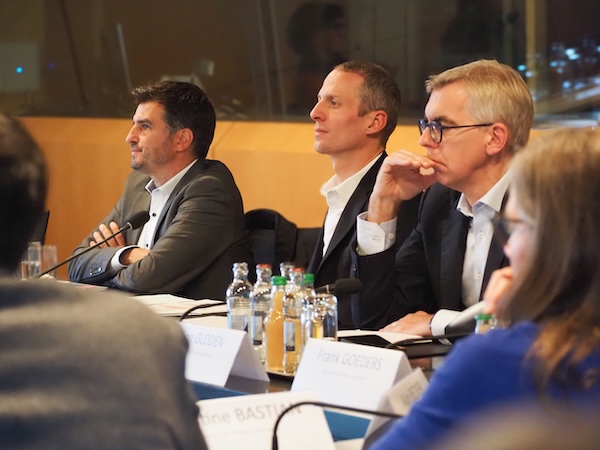 Gilles Biver, MECB; Serge Wilmes, Luxembourg Minister of the Environment, Climate and Biodiversity; Léon Gloden, Luxembourg Minister for Home Affairs;
Credit: MECB
Gilles Biver, MECB; Serge Wilmes, Luxembourg Minister of the Environment, Climate and Biodiversity; Léon Gloden, Luxembourg Minister for Home Affairs;
Credit: MECB
On Tuesday 11 November 2025, Luxembourg’s Ministry of the Environment, Climate and Biodiversity, in cooperation with the Ministry for Home Affairs and the Water Management Administration, organised the first national round table “Renaturéierungsdësch” at Senningen Castle.
According to the ministries, this initiative marks the launch of a nationwide consultation process to strengthen the country’s efforts in river renaturation. It forms part of the Government’s commitments to strengthen Luxembourg’s resilience to flooding and the impacts of climate change and sustainably improve and preserve the quality of aquatic environments and their biodiversity.
Working closely with the municipalities, the Government continued its efforts to restore rivers in order to better protect against flooding and to promote aquatic biodiversity. In addition, dams that no longer serve any practical purpose will gradually be removed, in line with heritage protection requirements.
The ministries reported that at the first round table, a wide range of key stakeholders involved in implementing these measures came together: representatives of the State, municipalities, inter-municipal syndicates, agricultural and environmental organisations as well as experts and institutional partners.
The main objective of the round table is to create a shared understanding of the issues, gather the needs and priorities of stakeholders and identify obstacles that hinder the implementation of projects in the field.
The day’s discussions were structured around concrete case studies illustrating the benefits of renaturation, followed by a participatory debate on possible solutions to overcome land-related, legal, organisational and financial obstacles.
“Renaturation offers multiple benefits: it is a powerful lever for enhancing biodiversity and protecting our citizens from flooding and it is a key measure for adapting to the impacts of climate change, contributing to quality of life in our municipalities,” emphasised Serge Wilmes, Minister for the Environment, Climate and Biodiversity, during the discussions.
Léon Gloden, Minister for Home Affairs, stated: “The benefits of renaturation are not limited to water protection; they also aim to reduce flooding. Renaturation therefore also concerns the resilience of our municipalities – a topic on which we are actively working within the framework of the national platform for disaster risk reduction.”
Moreover, the “Renaturéierungsdësch” (“Renaturation table”) will continue over the coming months with the work of the thematic working groups established for this purpose. The stakeholders involved will work together to identify concrete solutions and draw up an action plan. Ultimately, these results will be submitted to the Council of Government (Cabinet) with a view to accelerating river renaturation.








